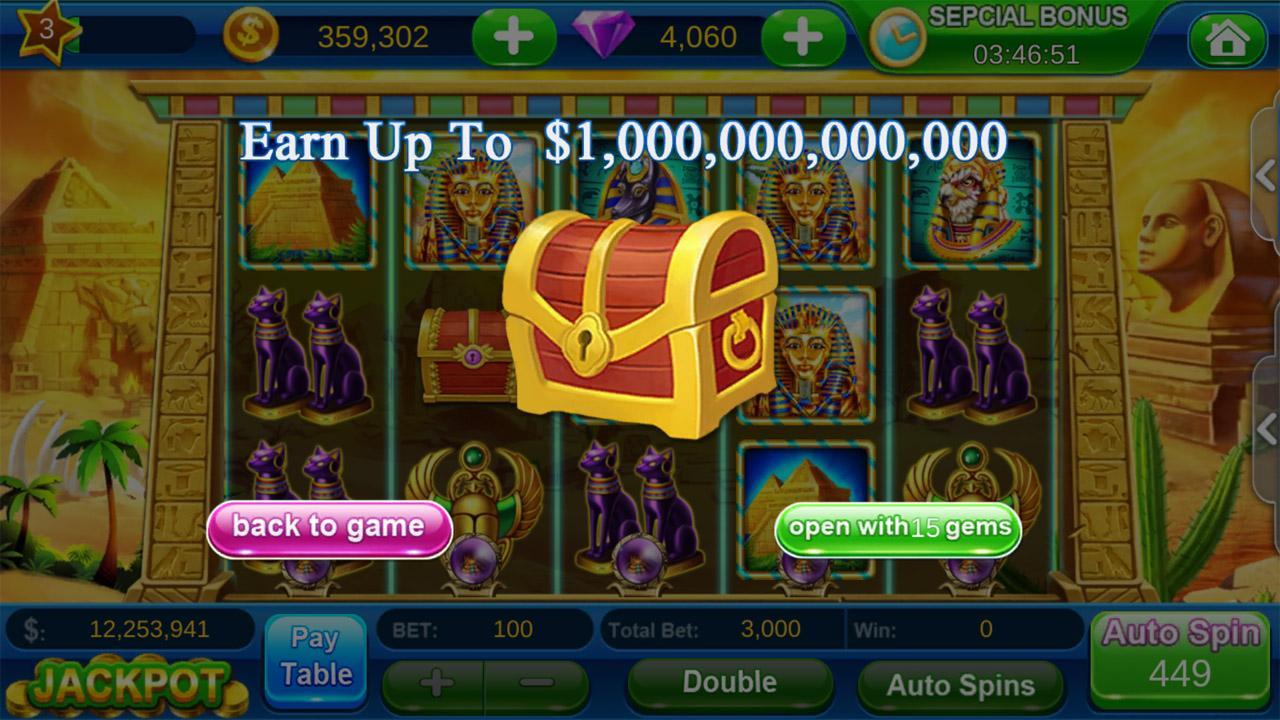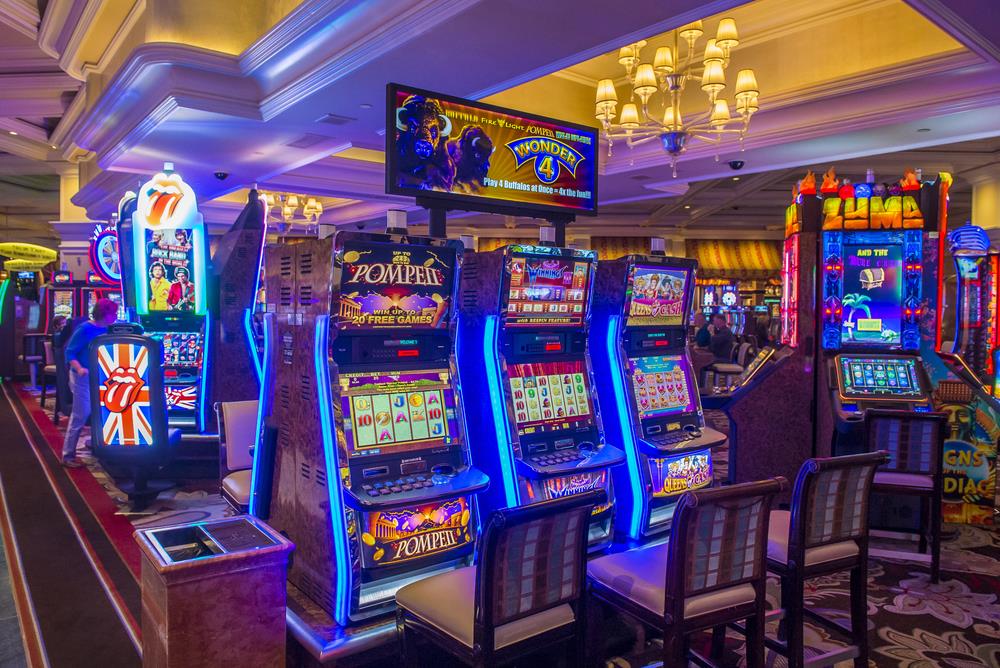The Slot Machine is a naturally occurring Structure in Shipwrecked worlds. It can usually be found on a small island with a Mangrove Biome connected with its own Set Piece, on four Wooden Flooring tiles with two Skeletons and two Dubloons lying around. Players can spend a Dubloon into the Slot Machine to get a random outcome.
Slots is a minigame featured in Super Mario Odyssey. It originates from the Sand Kingdom and is run by a Tostarenan, but is also found in the Metro Kingdom and in the Luncheon Kingdom. Mario must pay the Tostarenan 10 coins to play, and must throw Cappy at the slots in order for them to stop. The possible prizes from the slots are a Power Moon, a regular heart, a Life-Up Heart, and 40 coins, received by matching all of their respective images; failing to win results in being awarded a single coin. The slots in Sand Kingdom have three images that need to be lined up, while the slots in Metro Kingdom have four and the slots in Luncheon Kingdom have five. Otherwise, gameplay remains the same among all kingdoms. Obtaining all three Power Moons from the slots minigame unlocks the 'Slots Machine' Toadette Achievement in the Mushroom Kingdom. The music heard in the Slots rooms is an arrangement of the Spade Panel and N-Mark Spade Panel minigame music from Super Mario Bros. 3.
Names in other languages[edit]
| |||||||||||||||||||||||||||||||||||||||||||||||||||||||||||
Games available in most casinos are commonly called casino games. In a casino game, the players gamble cash or casino chips on various possible random outcomes or combinations of outcomes. Casino games are also available in online casinos, where permitted by law. Casino games can also be played outside casinos for entertainment purposes like in parties or in school competitions, some on machines that simulate gambling.
Categories[edit]
There are three general categories of casino games: gaming machines, table games, and random number games. Gaming machines, such as slot machines and pachinko, are usually played by one player at a time and do not require the involvement of casino employees to play. Tables games, such as blackjack or craps, involve one or more players who are competing against the house (the casino itself) rather than each other. Table games are usually conducted by casino employees known as croupiers or dealers. Random number games are based upon the selection of random numbers, either from a computerized random number generator or from other gaming equipment. Random number games may be played at a table or through the purchase of paper tickets or cards, such as keno or bingo.

Some casino games combine multiple of the above aspects; for example, roulette is a table game conducted by a dealer, which involves random numbers. Casinos may also offer other type of gaming, such as hosting poker games or tournaments, where players compete against each other.
Common casino games[edit]
Notable games that are commonly found at casinos include:
Table games[edit]
| Gaming machines[edit] | Random numbers[edit] |
House advantage[edit]

Casino games typically provide a predictable long-term advantage to the casino, or 'house', while offering the players the possibility of a short-term gain that in some cases can be large. Some casino games have a skill element, where the players' decisions have an impact on the results. Players possessing sufficient skills to eliminate the inherent long-term disadvantage (the house edge or vigorish) in a casino game are referred to as advantage players.
The players' disadvantage is a result of the casino not paying winning wagers according to the game's 'true odds', which are the payouts that would be expected considering the odds of a wager either winning or losing. For example, if a game is played by wagering on the number that would result from the roll of one die, true odds would be 5 times the amount wagered since there is a 1 in 6 chance of any single number appearing, assuming that the player gets the original amount wagered back. However, the casino may only pay 4 times the amount wagered for a winning wager.

The house edge or vigorish is defined as the casino profit expressed as the percentage of the player's original bet. (In games such as blackjack or Spanish 21, the final bet may be several times the original bet, if the player double and splits.)
Slot Machine Wiki
In American roulette, there are two 'zeroes' (0, 00) and 36 non-zero numbers (18 red and 18 black). This leads to a higher house edge compared to European roulette. The chances of a player, who bets 1 unit on red, winning is 18/38 and his chances of losing 1 unit is 20/38. The player's expected value is EV = (18/38 × 1) + (20/38 × (−1)) = 18/38 − 20/38 = −2/38 = −5.26%. Therefore, the house edge is 5.26%. After 10 spins, betting 1 unit per spin, the average house profit will be 10 × 1 × 5.26% = 0.53 units. European roulette wheels have only one 'zero' and therefore the house advantage (ignoring the en prison rule) is equal to 1/37 = 2.7%.
The house edge of casino games varies greatly with the game, with some games having an edge as low as 0.3%. Keno can have house edges up to 25%, slot machines having up to 15%.
The calculation of the roulette house edge was a trivial exercise; for other games, this is not usually the case. Combinatorial analysis and/or computer simulation is necessary to complete the task.
In games which have a skill element, such as blackjack or Spanish 21, the house edge is defined as the house advantage from optimal play (without the use of advanced techniques such as card counting), on the first hand of the shoe (the container that holds the cards). The set of the optimal plays for all possible hands is known as 'basic strategy' and is highly dependent on the specific rules and even the number of decks used. Good blackjack and Spanish 21 games have house edges below 0.5%.
Traditionally, the majority of casinos have refused to reveal the house edge information for their slots games and due to the unknown number of symbols and weightings of the reels, in most cases it is much more difficult to calculate the house edge than that in other casino games. However, due to some online properties revealing this information and some independent research conducted by Michael Shackleford in the offline sector, this pattern is slowly changing.[1]
In games where players are not competing against the house, such as poker, the casino usually earns money via a commission, known as a 'rake'.
Standard deviation[edit]
The luck factor in a casino game is quantified using standard deviations (SD).[2] The standard deviation of a simple game like roulette can be calculated using the binomial distribution. In the binomial distribution, SD = √npq, where n = number of rounds played, p = probability of winning, and q = probability of losing. The binomial distribution assumes a result of 1 unit for a win, and 0 units for a loss, rather than −1 units for a loss, which doubles the range of possible outcomes. Furthermore, if we flat bet at 10 units per round instead of 1 unit, the range of possible outcomes increases 10 fold.[3]
- SD (roulette, even-money bet) = 2b√npq, where b = flat bet per round, n = number of rounds, p = 18/38, and q = 20/38.
For example, after 10 rounds at 1 unit per round, the standard deviation will be 2 × 1 × √10 × 18/38 × 20/38 = 3.16 units. After 10 rounds, the expected loss will be 10 × 1 × 5.26% = 0.53. As you can see, standard deviation is many times the magnitude of the expected loss.[4]
Slot Machine History
The standard deviation for pai gow poker is the lowest out of all common casino games. Many casino games, particularly slot machines, have extremely high standard deviations. The bigger size of the potential payouts, the more the standard deviation may increase.
Slot Machine Games Wiki Call Of Duty
As the number of rounds increases, eventually, the expected loss will exceed the standard deviation, many times over. From the formula, we can see the standard deviation is proportional to the square root of the number of rounds played, while the expected loss is proportional to the number of rounds played. As the number of rounds increases, the expected loss increases at a much faster rate. This is why it is impossible for a gambler to win in the long term. It is the high ratio of short-term standard deviation to expected loss that fools gamblers into thinking that they can win.
It is important for a casino to know both the house edge and variance for all of their games. The house edge tells them what kind of profit they will make as percentage of turnover, and the variance tells them how much they need in the way of cash reserves. The mathematicians and computer programmers that do this kind of work are called gaming mathematicians and gaming analysts. Casinos do not have in-house expertise in this field, so outsource their requirements to experts in the gaming analysis field.
See also[edit]
References[edit]
- ^'Michael Shackleford is the wizard of odds'. Observer. Retrieved 13 October 2015.
- ^Hagan, general editor, Julian Harris, Harris (2012). Gaming law : jurisdictional comparisons (1st ed.). London: European Lawyer Reference Series/Thomson Reuters. ISBN978-0414024861.
- ^Gao, J.Z.; Fong, D.; Liu, X. (April 2011). 'Mathematical analyses of casino rebate systems for VIP gambling'. International Gambling Studies. 11 (1): 93–106. doi:10.1080/14459795.2011.552575. S2CID144540412.
- ^Andrew, Siegel (2011). Practical Business Statistics. Academic Press. ISBN978-0123877178. Retrieved 13 October 2015.